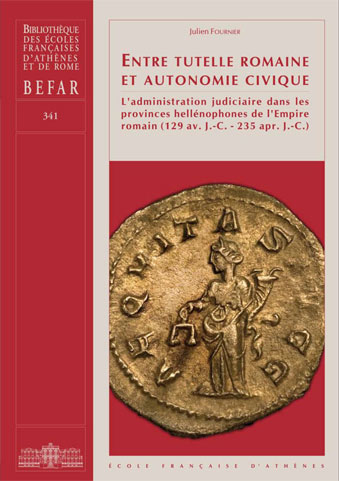
Julien Fournier
Entre tutelle romaine et autonomie civique
L'administration judiciaire dans les provinces hellénophones de l'Empire romain (129 av. J.-C.-325 ap. J.-C.)
Présentation éditeur
Conséquence inévitable de la conquête du monde hellénistique par Rome, la provincialisation de la
Macédoine, de l’Asie, puis de l’Achaïe, eut pour effet d’instaurer dans ces contrées la présence permanente d’une autorité supérieure, assortie du développement d’une administration calquée sur le modèle romain.
Loin de détruire les institutions civiques locales, cette autorité s’appuya sur elles. Dans le domaine judiciaire, l’étude croisée des sources épigraphiques, littéraires et juridiques, depuis la fin du IIe s. av. J.-C. jusqu’au milieu du IIIe s. apr. J.-C., met en évidence l’instauration, puis le développement d’un édifice complexe, superposant les éléments de droit et de procédure grecs et romains. Tandis que la juridiction provinciale s’organisait autour de la figure centrale du gouverneur, les cités conservaient des institutions judiciaires héritées pour la plupart de l’époque hellénistique, même si la participation populaire tendit à décliner au profit d’organes élitaires. Cette cohabitation imposa, sous la République, puis sous le Principat, la définition de critères du partage des compétences dictés par le pouvoir hégémonique en fonction de ses intérêts. Au travers du prisme judiciaire, l’Empire renvoie l’image d’un pouvoir pragmatique, réservant à ses tribunaux la haute juridiction pénale, mais laissant aux cités une part d’autonomie importante.
An inevitable consequence of the conquest of the Hellenistic world by Rome, the provincialisation of Macedonia, Asia, then Achaea, led in these regions to the permanent presence of a higher authority, combined with the development of an administration copied from the Roman model. Far from destroying the local civic institutions, this authority relied on them. In the legal domaine, a comparative study of the epigraphical, literary and juridical sources dating from the end of the second century BC to the middle of the third century AD, brings to light the installation and development of a complex structure of superposed Greek and Roman legal and procedural elements. While the provincial jurisdiction was organised around the central figure of the governor, the cities conserved the judiciary institutions inherited in the main from the Hellenistic period, even if popular participation tended to decline at the profit of elitist organs. This cohabitation imposed, during the Republic and the Principate, the definition of criteria for the sharing of competences dictated by the hegemonic power according to its interests. Seen through the judicial prism, the Empire presents the image of a pragmatic power, reserving for its tribunals the supreme jurisdiction in penal matters, while granting the cities an important degree of autonomy.
Contacts
- École française d’Athènes, 6, rue Didotou, 106 80 Athènes - + 30 210 36 79 922 - marina.leclercq@efa.gr - Ouvert tous les jours de 8h à 15h - Aνοιχτό καθημερινά από τις 8.00 έως τις 15.00
- De Boccard Édition-Diffusion, 11, rue de Médicis, F-75006 Paris - www.deboccard.com
